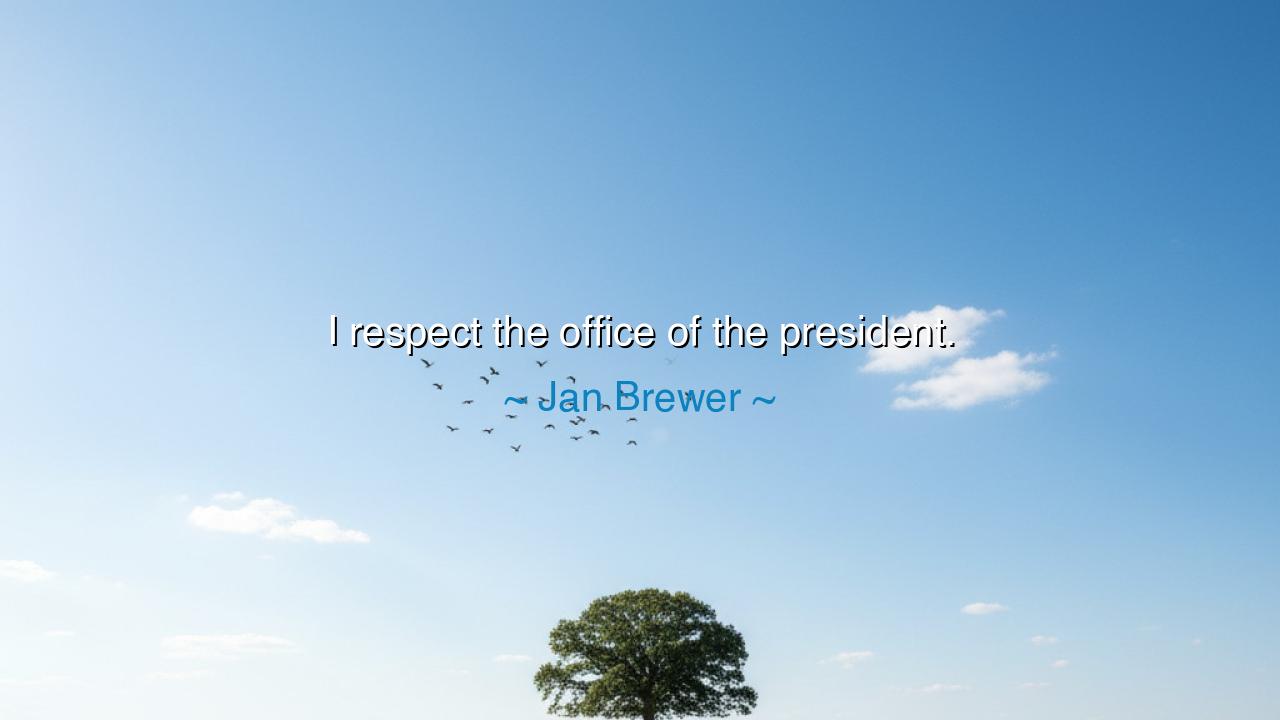
I respect the office of the president.






Hear now the words of Jan Brewer, who once declared: “I respect the office of the president.” Though simple in sound, these words carry a weight beyond their syllables. For in them lies the acknowledgment that authority, once entrusted by the people, is not merely the possession of a man or woman, but a sacred trust that binds an entire nation. To respect the office is to honor the symbol of unity, the vessel through which laws are guided, and the beacon by which a people chart their course.
The origin of this declaration lies in the turbulent arena of politics, where discord and passion often divide neighbors and friends. Brewer, though herself a leader of firm convictions, spoke of respect not as blind allegiance to the individual holding power, but as reverence for the institution itself. She recognized that while men and women may falter, the office of the president embodies something greater than one person—it is the embodiment of the collective will, the living contract of democracy, and the vessel of the republic’s endurance.
History offers us many mirrors for this truth. Recall George Washington, who, though once the general of a victorious army, chose humility and stepped aside after two terms as president. He knew that the office must stand higher than the man, that its power must not be seized as a crown but carried as a trust. In his choice, he enshrined respect for the role itself, ensuring that no individual would ever claim it as personal property. His reverence gave birth to a tradition that preserved the republic for centuries.
Consider also Abraham Lincoln, who bore the weight of the nation in its darkest hour. His enemies mocked him, his critics despised him, and yet even those who opposed him could not deny the sacredness of the office he held. For when he fell by the assassin’s hand, it was not only the man they mourned but the office itself, wounded by violence against the symbol of the people’s chosen leader. His sacrifice reminded the world that to dishonor the office is to dishonor the nation itself.
Brewer’s words, then, call us to a higher way of seeing. They remind us that respect is not given only when we agree, nor withdrawn when we dissent. The man or woman may falter, but the office remains, demanding from us a reverence that protects the very foundation of governance. Without such respect, authority becomes fragile, institutions crumble, and the house of order gives way to the winds of chaos.
The emotional power of this truth lies in its demand for humility. For to respect the office is to place the common good above personal pride, to recognize that the symbols of unity must be preserved even when our hearts burn with disagreement. It is a call to remember that the strength of a people lies not in their uniformity of opinion, but in their shared reverence for the structures that safeguard their freedom.
The lesson is plain: honor the office, even when you struggle with the person. In your own life, extend this principle beyond politics. Respect the teacher, even when you doubt their methods; respect the parent, even when you wrestle with their words; respect the judge, even when the verdict pains you. In doing so, you uphold not the flaws of the individual but the sacredness of the role they carry.
And finally, let your actions flow from this wisdom. Speak with civility even in disagreement. Defend the integrity of institutions, for they are the pillars upon which your liberty rests. Teach your children that respect is not weakness, but the strength that holds a people together. For as Brewer proclaimed, “I respect the office of the president”—and in those words lies the eternal truth that when we honor the role, we preserve the very soul of our nation.






AAdministratorAdministrator
Welcome, honored guests. Please leave a comment, we will respond soon